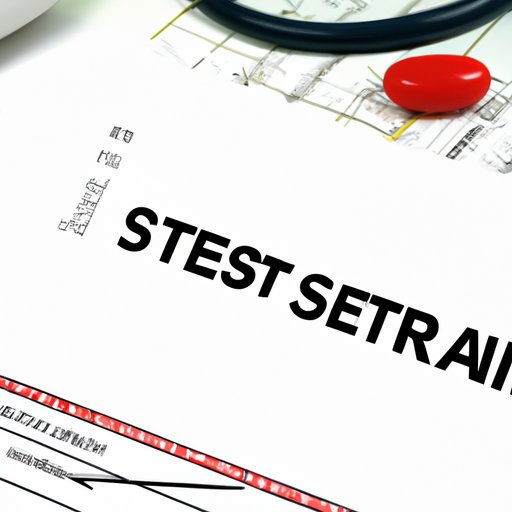
Introduction
A stress test is a medical evaluation to determine how well your heart works under stress. It is an essential test for assessing heart health and identifying potential problems. The test usually involves exercising on a treadmill or stationary bike while being monitored by healthcare professionals. In this article, we will discuss everything you need to know about how to prepare for a stress test to help you feel more comfortable and confident during the process.
Checklist of Items to Bring to the Stress Test
Before going for your stress test, it’s essential to have everything you need with you to feel more comfortable. Here are some items that you should bring:
Comfortable Clothing
It’s best to wear loose, comfortable clothing that allows for easy movement. Avoid tight clothes, such as jeans, and wear supportive athletic shoes.
A List of Medications and Supplements
Make a list of all the medications and supplements you are currently taking and bring it with you to the test. Your healthcare professional will need to know this information to ensure your safety during the test.
A Water Bottle
Staying hydrated is essential during the test. Bring a water bottle with you and drink water before, during, and after the test.
Any Necessary Heart Medication or Inhalers
If you have medication or inhalers related to your heart health, make sure to bring them with you.
Different Types of Stress Tests
There are several types of stress tests available, and your healthcare professional will recommend the best option for you based on your medical history. Here we discuss the three most common types of stress tests:
Exercise Stress Tests
In this test, you will walk on a treadmill or pedal a stationary bicycle, gradually increasing the speed and incline of the exercise. The goal is to raise your heart rate to a specific level. This process helps healthcare professionals to identify any heart abnormalities that may only occur during physical exertion.
Chemical Stress Tests
In this test, a medication is injected into your bloodstream to stimulate the stress response without exercise. This type of test is usually recommended for people who cannot exercise for any reason.
Nuclear Stress Tests
A nuclear stress test uses radiotracers and a special camera to take images of your heart before and after exercise or the injection of medication. This test helps to identify heart abnormalities that may not be visible on other types of tests.
Preparing Mentally for a Stress Test
Not only do you need to prepare physically, but it’s also crucial to be mentally prepared for the test. Here are some important relaxation and mindfulness techniques to help:
Relaxation Techniques to Reduce Anxiety
Deep breathing exercises, progressive muscle relaxation, and listening to calming music can help to reduce anxiety and stress levels.
Mindfulness Techniques to Stay Calm and Focused
Meditation or visualization exercises can help to stay calm and focused during the test. You can also try counting your breaths or repeating a calming phrase to yourself.
Steps Involved in the Actual Stress Test
Now that you know what to bring and how to prepare mentally, here is what to expect during the actual stress test:
Preparation Process
Your healthcare professional will provide instructions on fasting or dietary restrictions for several hours before the test. Make sure to follow these instructions to ensure accurate results.
Testing Itself
During the test, healthcare professionals will monitor your heart rate, blood pressure, and ECG. They will also ask you questions about your symptoms and how you are feeling.
Recovery Afterwards
After the test, it’s essential to rest and drink plenty of water to rehydrate. Your healthcare professional will discuss your results with you and recommend any necessary lifestyle changes to improve your heart health.
Following Up After the Stress Test
After the stress test, it’s important to follow up with your healthcare professional to discuss the results. Based on the results, they may recommend lifestyle changes like a healthier diet or more exercise. It’s crucial to stick to a consistent exercise routine to improve your heart health.
Conclusion
In conclusion, preparing for a stress test is essential to help you feel comfortable and confident during the process. Remember to bring comfortable clothing, a list of medications, a water bottle, and any necessary heart medication or inhalers. Be mindful of your mental health and consider relaxation techniques to reduce anxiety. Follow your healthcare professional’s instructions, rest after the test, and discuss the results with them afterward.





